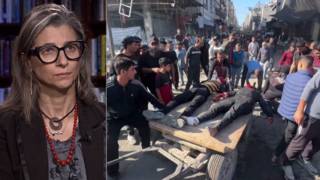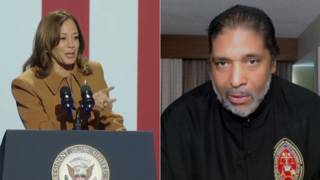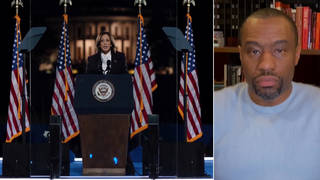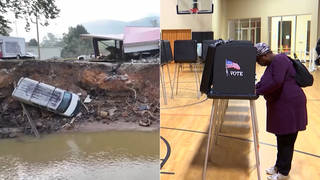
Related
Topics
Guests
- Monique ClescaHaitian pro-democracy advocate based in Port-au-Prince.
- Jake Johnstonsenior research associate with the Center for Economic and Policy Research, and author of Aid State: Elite Panic, Disaster Capitalism, and the Battle to Control Haiti.
- Otiende Amollomember of Kenyan Parliament.
Haiti is under a state of emergency after the country’s gangs freed thousands of people from the country’s largest prisons and are reportedly uniting to bring down Haiti’s de facto Prime Minister Ariel Henry, who has yet to return to the country since he traveled to Kenya last week to discuss a deal to bring a U.N. force of 1,000 Kenyan police to the island. “It is a desolation that we are feeling. It is a terror that we are living,” says Haitian pro-democracy advocate Monique Clesca about escalating gang violence that has already displaced thousands of Haitians. “We have been terrorized for the last 30 months of Ariel Henry’s government,” she says, emphasizing “the Biden administration has its hands in the bloodshed.” We are also joined by researcher Jake Johnston, who traces the relationship between U.S. intervention and Haiti’s unrest, “a process stoked and perpetuated by the international community, and namely the United States,” and we speak with Kenyan MP Otiende Amollo, who opposes the plan to send Kenyan “peacekeepers” to Haiti, calling it a move “that flies in the face of the rule of law.”
Transcript
AMY GOODMAN: We begin today’s show in Haiti, where Port-au-Prince’s international airport is reportedly under siege by armed gangs as Haiti is under a state of emergency. Tens of thousands have been displaced across the Haitian capital as they flee rising violence.
DISPLACED HAITIAN: [translated] The armed gangs forced us to leave our homes. They destroyed our houses, and we’re on the streets.
AMY GOODMAN: Over the weekend, Haiti’s powerful gangs freed thousands from Haiti’s largest prisons. The gang federation known as — leader, known as Barbecue, claimed responsibility and is calling for the ousting of unelected Prime Minister Ariel Henry. Gang members are reportedly uniting to bring down Haiti’s de facto Prime Minister Henry, who has yet to return to Haiti since he traveled to Kenya last week to discuss a deal to send about 1,000 Kenyan police to lead a U.N. peacekeeping force. The Kenyan High Court in January ruled the plan unconstitutional.
For more, we’re joined by three guests. In Nairobi, Otiende Amollo is a Kenyan parliamentarian who opposes the police deployment to Haiti. In Washington, D.C., Jake Johnston is with us. He runs Haiti Relief and Reconstruction Watch blog for the Center for Economic and Policy Research, author of the new book, Aid State: Elite Panic, Disaster Capitalism, and the Battle to Control Haiti. But first we go to Port-au-Prince, Haiti’s capital, to speak with Monique Clesca, a Haitian pro-democracy advocate who worked for many years with UNICEF and the United Nations overall, worked there for 15 years.
We welcome you back to Democracy Now!, Monique Clesca. Can you talk about what’s happening on the ground, as the images we see are the airport overrun and in the streets of Port-au-Prince people fleeing for their lives?
MONIQUE CLESCA: Thank you for inviting me. Thank you.
It is a desolation that we are feeling. It is a terror that we are living. And it’s horrifying, what we are going through. Since last Thursday, there has been an assault on different neighborhoods, different areas and state institutions. And yesterday was the big assault then on the airport. So, people cannot travel. People are scared. People cannot go to work. And on Saturday night, it was the jail. There was a massive assault on the Port-au-Prince jail, and there are about 4,000 — 4,000 — prisoners who are out in the streets somewhere, and among them presumed rapists, murderers, kidnappers, etc. So we are terrorized. We are terrorized in our homes.
But what I want to say is that — and it’s important to say that — we have been terrorized for the last 30 months of Ariel Henry’s government. There have been more massacres under Ariel Henry than there were under Jovenel Moïse, that had 13 massacres. So we have been in a state of terror, horror. Our people are dying, our sisters are being raped, our children are going to sleep hungry for the last 30 months or more. So, we are under a regime of bandits, bandits in ties, bandits in shorts. But bottom line, we are hostages of about maybe 3,000 men who are running the country either in gangs with ties and white shirts or in gangs in the slum areas roaming the streets and terrifying us. That is the situation we are living right now in Haiti.
And let’s be clear: The Biden administration has its hands in the bloodshed, because we, at least from the Montana Accord, have been saying since August 2021, two-and-a-half years ago, that this must stop. We have an alternative solution. We must get those criminals out of offices. We must get those criminals out. So, the Biden administration is paying the price, because there is no doubt in my mind that they bear a huge responsibility, along with the U.N., along with France, along with Canada. But the Biden administration has its knee on our necks, because we would not be here if they had listened to us Haitians, who have said for a long time, “This is unacceptable. This criminal regime is unacceptable to us Haitians.”
Throughout Haiti, Haitians have demonstrated and said Ariel Henry must go. So he can stay in Kenya. He can stay in Washington. Wherever he is, he can stay there. But we need new blood in the governance system of Haiti. We need visionaries, men and women who can provide for Haitians.
JUAN GONZÁLEZ: Monique Clesca, you focused, you said, on the criminals in white suits, or in white shirts. But the focus in this — in most the media coverage about Haiti here in the United States is on the gangs in the street. Are all these gangs the same, or are there distinctions between them? Because some people claim that some are more political than some of the other gangs, especially, for instance, this Jimmy Chérizier and his group. How do you regard the situation on the street with these gangs?
MONIQUE CLESCA: I am here to say that the government, coming from the U.N. reports that have said that, the former president of Haiti actually formed the gangs and armed gangs. So, since 2011, it has been a criminal regime that has armed the gangs. And now, perhaps, the gangs have felt stronger, and they are going about in their, whatever it is, their criminal business. But the point I am making is the government, people in power, president, prime ministers, ministers — there is even a document from the Yale Law School clinic and human rights organization in Haiti that said it’s a crime against humanity, under Jovenel Moïse, the massacre in La Saline, where 71 people were killed.
So, we are talking about a construct. This is not something that happened out of the blue. These government officers, as well as prime minister, president, and some economic oligarchs have financed the gangs. They have armed the gangs. They have given them even contracts to distribute food in neighborhoods, etc. So, we must be clear that the gangs have been instrumentalized in the past, created, armed, to terrorize us, so that they could keep power.
So, now the gangs have gained their independence, and maybe they have their political whatever, but I think the main culprit here is government that started to finance them, senators. A lot of them are under sanction for arming the gangs or for giving them money. A lot of the huge economic players in Haiti are also under sanction. Even a bank director is under sanction, even though it is not the United Nations sanctions. So, let’s be clear about this. There is no doubt in my mind about this, that the gangs with white shirts or whatever shirts and ties are also extremely involved — not only involved, but responsible for this.
And the United States knows this. We have told this to Assistant Secretary Brian Nichols. We have told this to Barbara Feinstein at the State Department. We have told this to Dan Erikson, who is now at the White House. We have told this. The Biden administration knows this, that it is a criminal regime that it is financing, that it is supporting, that it is helping to kill us.
And we say it’s enough. We need new leadership in Haiti. We need different governance that respects our human rights. This is untenable. This is unbelievable. It is inadmissible. We do not want this, and we are into resistance mode. We are saying, “No, we do not want this.”
And the Biden administration will pay for some of this, because there are a million-five Haitians in the United States, and they are beginning to threaten not to vote for Biden. So, vote elections are decided by a few thousand votes, so a million-and-a-half Haitians, that means a lot. They must reverse course. They must.
JUAN GONZÁLEZ: Yeah, I’d like to bring in Jake Johnston also, the author of the new book, Aid State: Elite Panic, Disaster Capitalism, and the Battle to Control Haiti. Welcome, Jake Johnston. Your assessment of the situation right now in Haiti and the steps that need to be taken to restore some sense of safety to the population and an actual functioning government?
JAKE JOHNSTON: Yeah. Thanks for having me. It’s a pleasure to be here.
I think when we look at Haiti, we have to understand some of the roots of what we’re seeing today. And at the heart of this is a broken social contract, a state that is no longer representative of or accountable to the population. And that has created the dynamics, the broader situation, that has allowed the situation to spiral the way it has.
And so, when you look at how to address that, you have to start there. And I’d echo Monique’s calls to focus on the political environment, right? We can’t divorce insecurity from the political environment. And you look at what’s happening now. I mean, this doesn’t happen in a vacuum, right? The armed groups don’t seize control, don’t take this, without at least some willingness or abandonment on the part of police hierarchy and government authorities. And so, to begin with, there has to be an acceptance of responsibility.
I think one of the most shocking things over the last four or five days has been the absolute, total silence from the government, right? Ariel Henry is not even in the country. The state of emergency was announced by the minister of finance in a press release. And so there’s really just, again, a total abandonment on the part of state authorities.
And like Monique said, you know, this is not a crisis entirely created in Haiti or by Haitians, right? We have to understand that this has been a long time coming, and it’s been a process stoked and perpetuated by the international community, and namely the United States. You know, we could go back to Haiti’s history, to its founding, first independent Black republic, successful slave revolt, the U.S. occupation. But we don’t need to go back that far into history to see this history of intervention: the 2004 coup d’état, the overturning of election results in 2010, and the United States’ insistence on moving forward with this current government against all odds and against the very clear expression from the Haitian people. And so, unless that begins to change, it’s extremely unlikely that the situation on the ground meaningfully improves.
JUAN GONZÁLEZ: And, Jake, I wanted to ask you about the role of former President Jean-Bertrand Aristide, obviously removed from office twice, but at the same time there are reports that he has had some kind of an accommodation with Ariel Henry and that his Fanmi Lavalas is basically on the sidelines these days. What information do you have about that?
JAKE JOHNSTON: You know, I think you have to — you know, it’s a murky political environment right now. There have been political negotiations and horse trading happening for two years. And I think, you know, that breakdown, the inability of Ariel Henry to actually come together and reach an accord and meaningfully balance power with alternatives, right? Like, there’s not a single elected official in the country. Power has been consolidated under one unelected person, who’s had questions over his legitimacy from the moment he stepped foot in the primator — right? — in the prime minister’s office. And so, of course, many political parties are trying to push, trying to prod. I think Fanmi Lavalas has certainly been one of them. But where this actually ends up, I mean, I think everyone is clear. And I think, in a lot of ways, what we’re seeing right now is a fight between protecting the status quo, trying to put the train back on the tracks, so to speak, or actually building something new — right? — refounding the state and rebuilding that social contract that has been broken.
AMY GOODMAN: I wanted to go to Jimmy Chérizier, known as Barbecue, speaking Friday.
JIMMY CHÉRIZIER: [translated] We ask the Haitian National Police and the military to take responsibility and arrest Ariel Henry. Once again, the population is not our enemy; the armed groups are not your enemy. You arrest Ariel Henry for the country’s liberation. These weapons that we have are not here to hurt our brothers who come from the same milieu as us. The poor take the streets, and they trust us. These weapons are our symbol of freedom. With these weapons, we will liberate the country, and these weapons will change the country.
AMY GOODMAN: Monique Clesca, Barbecue, or Chérizier, is the leader of the gang federation G9 Family and Allies. They’ve joined together all the gangs. This is significant. And he’s saying that they won’t let Henry back into the country. Can you talk about the significance of this alliance and who he is?
MONIQUE CLESCA: Well, I don’t want to talk about who he is, because I think he said who he is and he showed who he is. And he has been showing who he is for years now.
What I want to say, though, is that I don’t believe in violence. And the Montana movement that I’m part of does not believe in violence, and we condone [sic] violence. Guns cannot be symbols of a freedom. Guns cannot be that.
So, another question is: Where are they getting all of these ammunitions? Where are they getting all these guns, M-14, M1, Kalashnikov, etc.? Where are they getting them? So, I think it is important to say that. The guns are coming from — mostly from Miami, from the United States. Some are coming from the Dominican Republic, through the Dominican Republic, but there. So I think that is the central issue there, you know, in terms of where are the armed groups, because they say they are armed groups, and they claim that, and they have their project, but where is it coming from?
And what I’m saying is, we have been living under — we have been kidnapped. We have been killed. Our sisters are raped. So, let’s be very clear about this. The gangs, I cannot say much more about the gangs other than what their actions have shown. What I know, though, is that in Haiti they have been supported by the governors of Haiti, the leaders, like Ariel Henry.
And the social justice agenda that we have — people are not eating, people don’t have healthcare, people are not going to school — is extremely important, and that’s what must be put forward. The issue of youth in Haiti, 65% of the Haitian population is under 24 years old. So, when you hold a gun next to them, as opposed to feeding them, then very often they might go the other way, towards the gun. And what we need to do is have leadership, men and women, who can say that we will respect that social contract, that Jake Johnston is talking about, to remove this massive inequality, respect the human rights of Haitians, and feed Haitians, give them healthcare, particularly the youth. Two-thirds of the country is under 24 years old. We need to focus on them, rather than focus on the gangs and everything else. And that’s why we need to break what is right now a government that is killing us, literally and figuratively, with the help of the U.N. and the United States, the Biden administration. So that is a focus for me.
AMY GOODMAN: I wanted to bring in Otiende Amollo, who is a Kenyan MP, member of Parliament. Ariel Henry was last seen in Kenya sealing the deal of sending 1,000 Kenyan police as part of a U.N. force, peacekeeping force, to Haiti. And yet the Kenyan High Court in January ruled the plan was unconstitutional. You had a group of Kenyans go to Haiti to investigate the situation. They came back almost immediately, within hours, then went to Washington to work out the deal. And one of those Kenyans, 39-year-old Nyamato Walter, was found dead in his Washington, D.C., hotel room. Otiende Amollo, can you talk about the plan? And are a thousand Kenyan police being sent to Haiti?
OTIENDE AMOLLO: Thank you very much, and thank you for having me.
The sense in Kenya is that the idea of sending 1,000 police officers to Haiti is unpopular. That is the general sense. But I would say the move is wrong on at least four fronts. First, it is legally unfounded. Secondly, the process declared, itself, is flawed. Thirdly, the rationale is quite shaky. And more importantly, the arrangements that seem to have been put in place are weak.
In the first place, yes, the court in Kenya declared the process unconstitutional and improper. And that declaration was based on two things. First, it’s based on the idea that we have not had a bilateral treaty with Haiti, and we have not had any reciprocation arrangements by way of an agreement. It is that agreement that was now sought to be had last week, which has still not been perfected.
But it still leaves a lot of issues that are pending. The biggest issue is that under our Constitution, under our laws, our police force cannot be deployed abroad. Our police force is national. They can only operate within the Kenyan borders. On the contrary, it is the armed forces that can be deployed. For some strange reason, they have chosen to deploy the police, which still remains against the Constitution. We have a Constitution that clearly distinguishes between the police service and the defense forces. Only the forces can be deployed, with the approval of the National Assembly. As we speak, and for reasons that I think Monique has already captured, we do not have any bilateral or treaty arrangement between Kenya and Haiti, I think primarily also because there’s no legitimate legislature or executive that can maintain to the arrangement. And so, the idea of the reciprocation agreement, that was apparently entered, you know, last week or was being negotiated, is still one that is not well founded in the Constitution.
But beyond that, we have questioned the process. The process is flawed from the one go. There was no request to this country to send any forces or any police officers. Instead, it is clear that our government offered, and immediately the offer was met. The president of the United States welcomed that move. And it is only thereafter that there was a move to bring the issue to the U.N. Security Council, you know, by way of ratification. As I understand it, there was a general resolution which invited support. It was not specific to Kenya. It invited those who can, you know, support to so support. It came at a time that there were active court orders, which have still not been set aside. So, the entire move is one that flies in the face of the rule of law.
Sadly, we keep saying that we have thousands of armed forces, you know, personnel who are in the barracks. And we have police officers who are not even enough to man this country. As you may have seen in the papers, there are pockets of insurrection in this country, and deaths, in a place called Baringo. People were killed three days ago in a place called Samburu, even as late as yesterday. And our argument is, you cannot deploy the police abroad when you need the police in Kenya.
In terms of priority — and I think Monique said some things that are very profound in terms of history — we think that in terms of assistance, there are countries that carry the higher burden of intervention than Kenya, countries that have had historical involvement with Haiti, countries that have much more superior, you know, defense forces that could intervene, countries that have been seen to intervene elsewhere. And why they would then bypass and ask Kenya to send a thousand police officers is what we are questioning. It just amounts to bypassing.
From what Monique described and what we’ve seen in the media, a thousand police officers, even if there were 5,000, cannot bring any — you know, any sanity to this situation. So, we are very worried that the 1,000 police officers sent to Haiti, we are not sure where they are right now anyway, but we fear that —
JUAN GONZÁLEZ: Mr. Amollo, if I can, I just wanted to get in Jake Johnston, because we’re almost running out of time. And, Jake, I wanted to have your last comments. This whole issue of whether a peaceful change in Haiti can occur, or whether the failure of the government, the threat of new international intervention and the desperate situation of the Haitian people really does call for some kind of an armed revolt by the people of Haiti, your sense of that?
JAKE JOHNSTON: Well, look, I mean, I think, you know, in regard to the Kenyan mission — right? — I mean, we have to understand that there was United Nations peacekeepers following the 2004 coup d’état that were in the country for 13 years, at a cost of over $7 billion. And so, we’re now talking about doing this, but the situation on the ground is a reminder of the failure of those efforts, right? We’re talking about a situation now in Haiti where police can’t even get paid, and we’re shocked that they’re not putting up more resistance.
So, I think, you know, the solutions are local. They can be local, right? International actors have a role to play in supporting actual local solutions, rather than undermining local institutions and local organizations, which has been a pattern repeated ad nauseam over Haiti’s history, right? So, I think there can be a peaceful resolution, but it’s going to take change in policies both in Haiti and especially in the United States, as well.
AMY GOODMAN: Jake Johnston, we want to thank you for being with us, runs the Haiti Relief and Reconstruction Watch blog for Center for Economic and Policy Research. His new book, Aid State: Elite Panic, Disaster Capitalism, and the Battle to Control Haiti. We want to thank Monique Clesca, Haitian pro-democracy advocate, speaking to us from Port-au-Prince, and Otiende Amollo, Kenyan member of Parliament, speaking to us from Nairobi.
Next up, federal prosecutors rest their case against the former Honduran president, accused of turning Honduras into a narco-state. We’ll get the latest, in 20 seconds.













Media Options